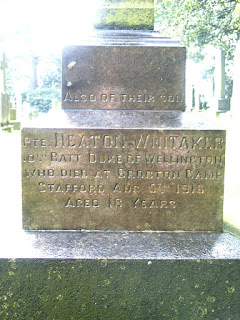There was a continuation of the artillery duels of the last
few days and it was noted that “a good many” German shells had struck Albert.
Around noon ‘C’ and ‘D’ Companies re-joined the remainder of
the Battalion at Scots Redoubt and in the early evening the whole Battalion
moved forward the short distance north-east to Peake Wood to relieve 9th
Yorkshires. Despite continuing artillery exchanges, this move was effected
without casualties.
Cpl. John William
Wardman (see 16th July)
who had been suffering from influenza, re-joined the Battalion.
Lt. George Reginald
Charles Heale (MC see 29th
July) reported sick, suffering from boils on the back of the neck; he was
treated locally in the first instance and it was soon reported that his
condition had improved.
 |
| Lt. George Reginald Charles Heale, MC |
Pte. Michael Hopkins
(see 3rd February),
serving with 9DWR, was posted back to England, having suffered wounds to his
left arm in recent actions (details unknown).
Pte. Heaton Whitaker
(see 3rd April), who was
serving with 11DWR having been in England since being wounded in April, was
accidentally drowned. The circumstances of his death would be described to his
family by Lt. James Watson Paterson (see below), who was in temporary charge
of Pte. Whitaker’s company when the accident occurred: “It is with very sincere
regret that I have to inform you of the death by drowning of your son, Private
Whitaker. It appears that he went with some of his chums yesterday afternoon to
bathe in a river near here, and that he got entangled in the weeds in the river
bed and was drowned before any assistance could be given him. The coroner’s
inquest will be held tomorrow or Tuesday morning, after which arrangements can
be made for the burial. He can be buried here or the body sent home to you,
just as you prefer. In case you decide on the latter course, the officers and men
will bear the expense of sending the body to you. On behalf of the commanding
officer and men of ‘D’ Company, I would like to express the sincere sympathy
which goes out to you at this time of great bereavement. The deceased will be
missed amongst us, and we mourn the death of one or our most beloved comrades.”
The family would also receive a letter from Capt. Leo Frederick Reincke (see
below), commander of ‘D’ Company: “I was very sorry indeed upon returning
to camp last Sunday night to hear that your boy, Private Whitaker, of this company,
had been drowned whilst bathing … He was a special friend of mine in the company,
and I should like you to know that there are others who will miss his cheery
nature besides his close relations. He had quite a charm of his own, and though
he had been here only a comparatively short time he entered into the spirit of
everything and was very soon a general favourite.” Pte. Whitaker’ body would indeed be returned home and he would be buried at Stanbury Cemetery, near
Haworth.
 |
Pte. Heaton Whitaker
Images and additional information by kind permission of Andy Wade and 'MenofWorth'
|
Lt. James Watson
Paterson would later serve with 10DWR. Born in Edinburgh in 1889, he was
the son of Thomas Watson Paterson, a teacher. He had joined the Scots Guards
following the outbreak of war and had been posted to France on 25th
May 1915 with 2nd Battalion, but whad been discharged on appointment
to a temporary commission with 11DWR on 23rd July 1915. He had been
promoted Temporary Lieutenant with effect from 1st May 1916 and would
be promoted Temporary Captain from 1st September 1916. Capt. Leo Frederick Reincke would also later
serve with 10DWR. He was born in 1887, in Camberwell, the son of German civil
engineer Hans Roderich Leopold Reincke and Annie Sophia Reincke (née
Wattenbach), of London. He was educated at Dulwich College Preparatory School
and Dulwich College itself. He was in Egypt on the outbreak of war in 1914, but
had immediately returned to Britain, being commissioned into the Dukes. Reincke
was then employed with 11th Battalion in the instruction and training
of troops.
Following seven weeks’ treatment for neurasthenia, Pte. Eli Bradley (see 18th June) was discharged from the Military Hospital
in York. He would be allowed three weeks’ leave before reporting to 83rd
Training Reserve Battalion at Gateshead.
Lt. Thomas Beattie,
(see 3rd August) who had
been wounded in the left shoulder by shrapnel two days earlier while serving
with 9DWR was x-rayed and then operated on at no.2 Red Cross Hospital, Rouen;
he would later serve with 10DWR.

No comments:
Post a Comment